|
I’m participating in an advanced picture book intensive with agent Sean McCarthy through Inked Voices. If you are a writer and don’t know about Inked Voices, I suggest you check out the organization. This is the fourth Inked Voices workshop I’ve participated in, and I’ve learned a lot from each one. The format of the intensive workshop requires that you submit three picture book manuscripts. Then, revise one manuscript and submit it two more times for submission. After the first round of submissions, most participants agreed that I should work on revising my manuscript, which was then called Chicks Rule, Dogs Drool. Sean McCarthy not only thought I should revise it, he thought I should start from scratch. He had various reasons such as the first format didn’t have high enough stakes, the story didn’t support the scientific concept I talked about in my back matter, and the main character wasn't clear. After gnashing my teeth, I started over. I read a bunch of Aesop’s fables and stories that featured relationships between predator and prey such as The Lion Inside by Rachel Bright and Jim Field, which I love. So, I rewrote my manuscript in the rhyming style of The Lion Inside. Besides the fact that I lacked consistent meter, the version didn’t work. As my critique group member Sarah Brannen said, “You’ve solved the problems the agent talked about, but created a host of new ones.” More people chimed in with various ways to strengthen the manuscript and someone said, “You need a Greek chorus, like The Little Red Hen.” Then, the critique group itself became a Greek chorus as they all heartily agreed. If I was going to try writing my story with a Greek chorus like The Little Red Hen, I had to read various versions of The Little Red Hen. It was super fun, and I learned a lot. I thought I’d share my observations on each version of The Little Red Hen in case educators are looking to study The Little Red Hen. The Classics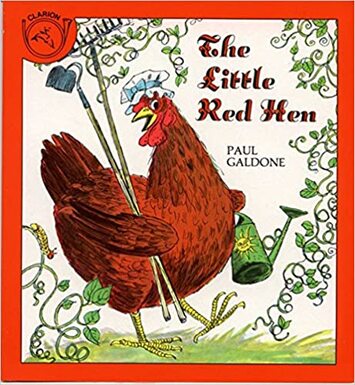 Originally published in 1979, with a renewed 2001 copyright, Paul Galdone tells the classic tale. The Greek chorus is “Not I,” and the cat, dog, and mouse don’t get a single crumb of cake from the fed up hen. But they do learn their lesson, and always help out from that day forward. What I like about Galdone’s illustrations is that he showcases the secondary characters’ laziness one-by-one. The reader sees the cat sleeping on the couch, the dog napping in the hammock and the mouse snoozing in the chair. 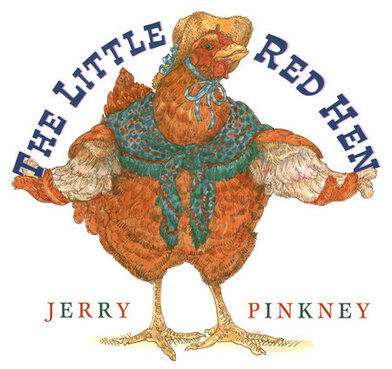 I love Jerry Pinkney’s art. His illustrations are stunningly gorgeous. Like Paul Galdone’s version, the secondary characters, the goat, pig, dog and rat, get nothing. Their Greek chorus is also, “Not I.” Not only do the animals not receive any bread from the hen, but the reader doesn’t learn whether or not the secondary characters learned their lesson. One fun aspect of Pinkney’s version, is that all the animals have a color word in their name: the short brown dog, the tall black goat, the round pink pig and the thin gray rat. So, if you want to teach color words or focus in on adjectives, start with this book. The Classic With A Twist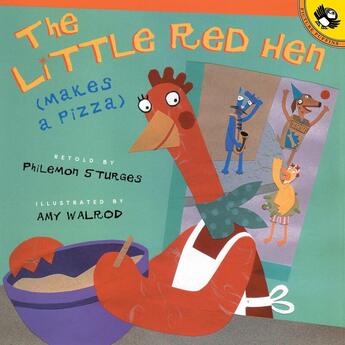 Full disclosure, before Philemon Sturges passed away he lived in my town. I never had the pleasure of meeting him, but out local library had his books. My sons loved this book, and we frequently checked it out from the library. This book has the classic Greek chorus of “Not I,” and the usual cast of secondary animals—a duck, dog and cat. But instead of baking a cake or bread, this Little Red Hen bakes a pizza. So, if your family has a pizza night, pick up this version. Twisted Tales Inspired By The Classics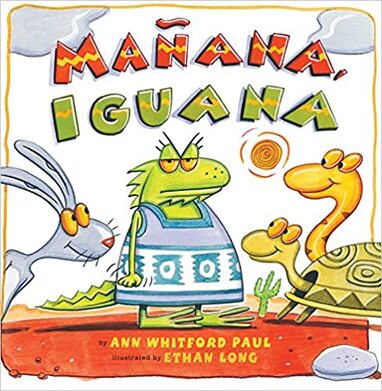 If you’d like to teach your learners some Spanish vocabulary, pick up this book. Ann Whitford Paul uses the Spanish names for the days of the week and the southwestern characters featured in the story: el conejo (the rabbit), la culebra (the snake) and la tortuga (the tortoise). Unlike the classic tale, each of these characters has his or her own saying to refuse to help. Instead of baking something, the iguana is throwing a party and has to do all the preparations herself. What’s nice about this version is the secondary characters realize their mistake and are too embarrassed to enjoy the party. Then, they come up with an idea of how to be helpful. After that, Iguana invites them to enjoy the leftovers. 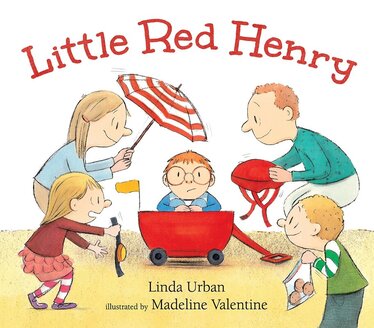 Linda Urban created a fantastic bedtime story. The human family has been treating Little Red Henry like a baby and he decides to assert his independence until it is time for bed. The Greek chorus in this version is “Let me!” because each family member wants to do tasks for Henry instead of letting him try to do it by himself. 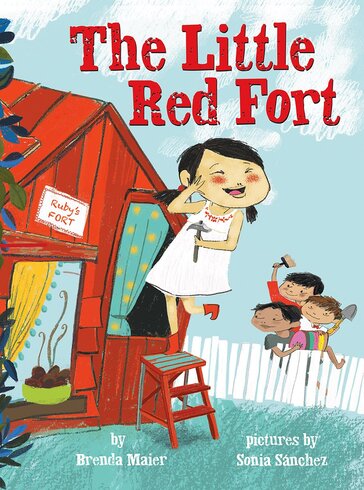 I love Brenda Maier's STEM story. Ruby, the little sister, is determined to build a fort even though her three lazy older brothers refuse to help her. Not only do they refuse to help her, but they insult her and tell her she doesn’t know “how to build anything.” Ruby is not deterred. Unlike the classic tales, the secondary characters have a chance to redeem themselves. In addition, there’s excellent back matter on the history of the folktale The Little Red Hen. To top it off, there’s a fun page that shows readers all the different types of forts they can build at home. Happy Reading!
0 Comments
Leave a Reply. |
Chalk + Ink ChatsWant to hang out with teachers who write and writers who teach? Fill this form to join our Archives
October 2023
Categories |
